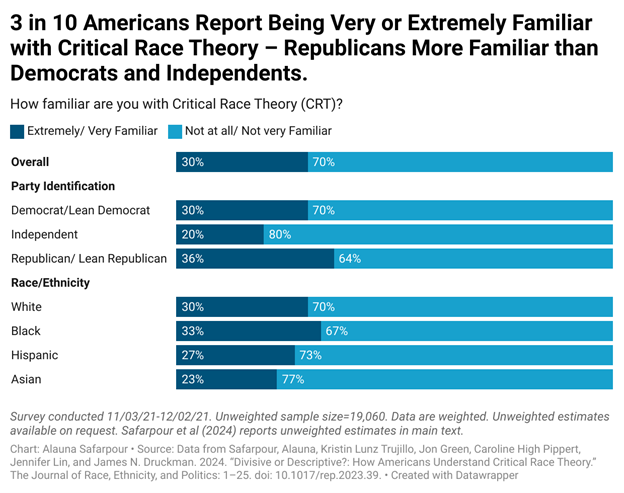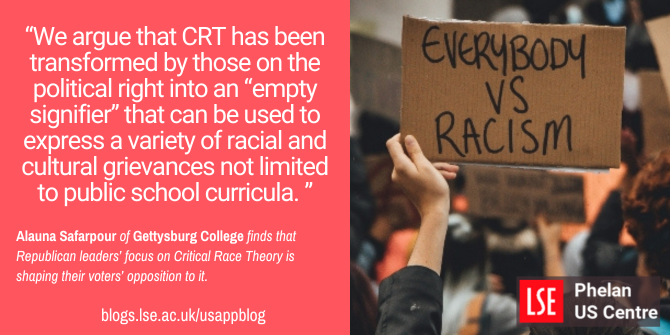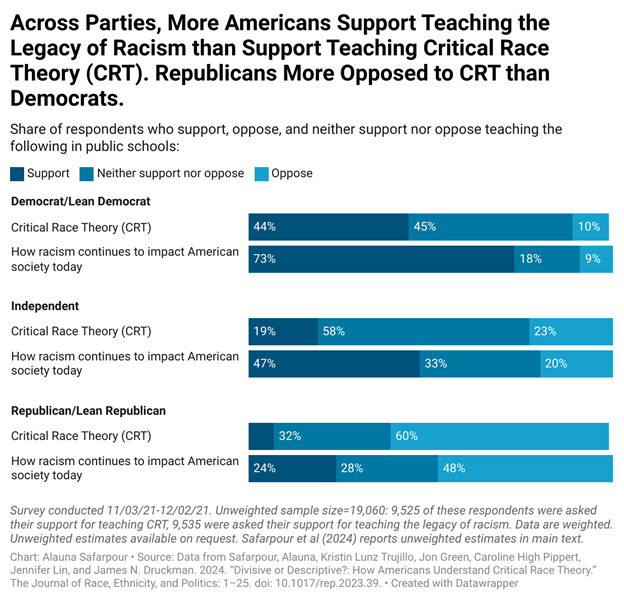 Recent years have seen fierce debates over the teaching of Critical Race Theory in US schools with many Republican-led states adopting measures to restrict or ban how race, racism, and history can be taught in public schools. In new research, Alauna Safarpour writes that the public’s perceptions of Critical Race Theory are being driven by Republican elites. She finds that Republican activists have swayed their voters towards a more negative stance towards Critical Race Theory by successfully branding it as a controversial and all-encompassing issue that extends well beyond what is taught in public schools. She also finds that more Americans support teaching about the persistent impact of racism on modern society than support teaching Critical Race Theory.
Recent years have seen fierce debates over the teaching of Critical Race Theory in US schools with many Republican-led states adopting measures to restrict or ban how race, racism, and history can be taught in public schools. In new research, Alauna Safarpour writes that the public’s perceptions of Critical Race Theory are being driven by Republican elites. She finds that Republican activists have swayed their voters towards a more negative stance towards Critical Race Theory by successfully branding it as a controversial and all-encompassing issue that extends well beyond what is taught in public schools. She also finds that more Americans support teaching about the persistent impact of racism on modern society than support teaching Critical Race Theory.
Debates over race have frequently been closely linked with discussions about education policy in the US. The Supreme Court’s 1954 decision in Brown v Board of Education, which ruled that segregated public schools were unconstitutional, sparked fierce national debates and protests over educational segregation.
In 1974, a federal judge ordered students be bused to de-segregate Boston city schools, which ignited disruptive protests across the city that often turned violent. Protests by white Americans over school busing in the 1970s and 1980s led to extensive public opinion research into the drivers of busing attitudes.
Fast forward to the modern era, and we have again seen waves of protests over how history and race are taught in schools. In recent years, these debates have focused on the supposed teaching of Critical Race Theory, a relatively obscure, advanced theory of the impact of race and racism in American society.
Elite debate over Critical Race Theory
Today, Critical Race Theory (CRT) stands at the crossroads of heated national discourse in the United States, encapsulating wider tensions that pervade discussions on American politics and education. To date, over 750 measures to restrict how race, racism, and history can be taught in public schools have been introduced by lawmakers across the United States. According to reporting by Education Week, restrictive measures have been introduced in 44 states since January 2021 and 18 states have adopted a law or similar state-wide measure.
Much of this discourse has taken place at the elite levels, among opinion journalists, activists, and elected officials. But when elites say, “Critical Race Theory,” what does the public hear? In recent work, my co-authors and I provide a comprehensive analysis of the American public’s perceptions of CRT.
Using an embedded survey experiment, we compare views on teaching “Critical Race Theory” in schools to views on teaching about the continued impact of racism on American society. We also examine the predictors of attitudes towards CRT including an individual’s race/ethnicity and party affiliation, as well as a measure of individual racism toward Black people (among other predictors).
The divide over CRT
Our research reveals a stark divide, with Republican elites successfully branding CRT as a controversial and all-encompassing issue that extends well beyond what is taught in public schools, thereby swaying Republican voters towards a more negative stance. This contrasts with Democrats’ more uncertain or neutral perceptions, which parallel the muted discussions by elites on the left. As Figure 1 shows, Republicans are significantly more likely than Democrats and Independents to report being familiar with CRT (though overall familiarity with the term is low, at roughly 30 percent), and these differences persist even after accounting for alternative factors which may predict familiarity, such as education, race, or parental status.
Figure 1 – Familiarity with Critical Race Theory by party identification and race/ethnicity

We argue that CRT has been transformed by those on the political right into an “empty signifier” that can be used to express a variety of racial and cultural grievances not limited to public school curricula. This strategy has not only shaped but also polarized public sentiment. This polarization is reflective not of a grassroots consensus but rather of an elite-driven narrative that has redefined CRT to fit broader racial and societal debates. For instance, as Figure 2 shows, we find that Republican members of Congress have mentioned CRT more often than have Democrats in e-newsletters sent to constituents. This greater focus by Republican elites has succeeded in making Republican voters more familiar with CRT and more likely to oppose the teaching of CRT in schools than Democrats. Through an extensive analysis of open-ended responses, we also find that the way that Republican elites have framed CRT has successfully shaped the attitudes of rank-and-file Republican voters.

Photo by Arthur Edelmans on Unsplash
Figure 2 – References to ‘Critical Race Theory’ in Congressional e-newsletters

Critically, we also find that opposition to Critical Race Theory is not the same thing as opposition to teaching about the persistent impact of racism on modern society (Figure 3). Instead, CRT is viewed as something larger and distinct, with open-ended responses frequently defining CRT as racism towards white people. Support for teaching how racism continues to impact American society today is significantly greater than support for teaching CRT among Americans of all party affiliations.
Figure 3 – Support for teaching Critical Race Theory and teaching the legacy of racism by party affiliation

Elite framing informs public opinion on Critical Race Theory
Our research underscores the challenges inherent in discussing race and racism within the American educational system, exacerbated by the political elite’s ability to influence and shape public discourse. As the United States grapples with these issues, our findings offer crucial insights into the dynamics of public opinion, the power of political framing, and the complex landscape of American politics and policy.
For policymakers, educators, and the public, understanding these dynamics is essential for navigating the contentious debates surrounding CRT and race relations in America. Our work not only sheds light on the current state of public opinion but also raises important questions about the role of education, the influence of political elites, and the pathways towards a more informed and nuanced discussion on race and racism in the United States.
- This article is based on the paper, “Divisive or Descriptive?: How Americans Understand Critical Race Theory” in The Journal of Race, Ethnicity, and Politics.
- Please read our comments policy before commenting.
- Note: This article gives the views of the author, and not the position of USAPP – American Politics and Policy, nor the London School of Economics.
- Shortened URL for this post: https://wp.me/p3I2YF-dFl






